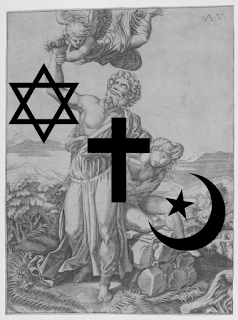Last entry I wrote about my frustration at having no outlet during a time of even greater global turmoil than usual: the first major war in Europe during my lifetime, renewed war in Southwest Asia (aka the "Middle East"), and looming over everything, global climate change. In the current round of crises, and in particularly the outbreak of war in Southwest Asia, so much remains unsaid, so many problems seem to me to have gone without a mention, I just feel a need to speak, if only to say things I think obvious.
 |
| The sacrifice of Isaac |
If I lived in Jerusalem, whatever my ethnicity, origin, or beliefs. my existence would represent a hope of redemption to millions of people, and an intolerable obstacle to the divine purpose to millions of others. The vast majority of us do not live in places where the doctrines, hope, fears, and profoundly fraught histories of the three Abrahamic religions collide. That small slice of Southwestern Asia, roughly between the Jordan River Valley and the Mediterranean coast does not simply carry the burdens of a complex history; millions of people around the world have a deep attachment to its fate.
Different people will have profoundly different reactions to this reality, from profound indifference, to disgust for people who hold religious views, to passionate engagement on one side or another. Whatever we feel about the situation, it will do us no good, and at best simply waste time, to press for ordinary political solutions to the conflicts over this land without addressing the religious hopes, the history, and the fears millions of people, both within and without the contested land itself, bring to this conflict. For that reason, a appeals to logic and morality we might expect to work in other conflicts have less effect here. Parties striving toward a spiritual goal do not merely refuse to respond to secular restraints; religious teachings, Christian among them, often hold up defiance of secular authority for religious goals as one of the highest forms of the good.
Politics has few more irritating, and few less helpful, phrases than "why don't they just..." Individuals and communities have reasons for the things they do, the things they don't do, and for not "just" solving problems ways some of us think they should. When the reasons for a conflict arise out of well known religious feelings, traditions, and histories, it makes even less sense to ignore them.
No comments:
Post a Comment